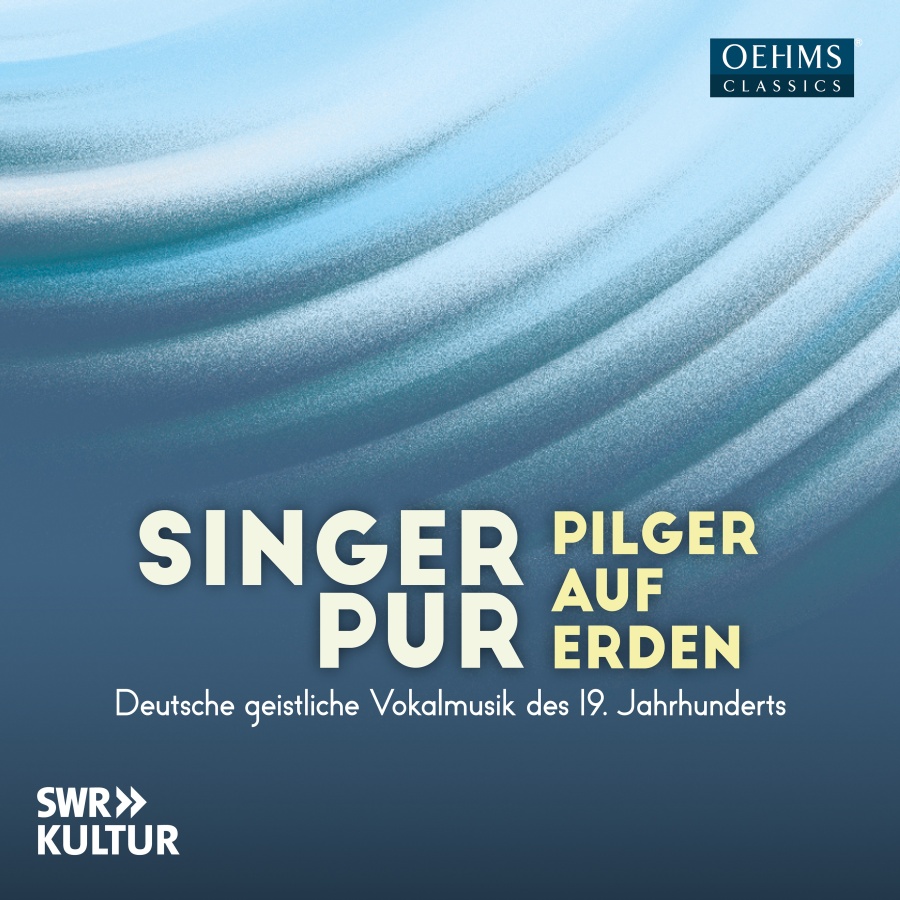
kompozytor
różni kompozytorzy
tytuł
Pilger auf Erden
pełny spis kompozytorów
Rheinberger, Josef Gabriel;
Becker, Albert;
Herzogenberg, Heinrich von;
Cornelius, Peter;
Wolf, Hugo;
Loewe, Carl;
Bruckner, Anton;
Reger, Max;
Bruch, Max;
Liszt, Franz;
Haller, Michael;
Le Beau, Louise Adolpha;
Mendelssohn, Felix
Becker, Albert;
Herzogenberg, Heinrich von;
Cornelius, Peter;
Wolf, Hugo;
Loewe, Carl;
Bruckner, Anton;
Reger, Max;
Bruch, Max;
Liszt, Franz;
Haller, Michael;
Le Beau, Louise Adolpha;
Mendelssohn, Felix
wykonawcy
Singer Pur
nr katalogowy
OC 1728
opis
Music developed relentlessly in the tense environment of the 19th century. Many composers broke away from firmly established conventions, taking ever greater liberties and forming a counterpart to the industrial and technical revolutions taking place at the same time. Singer Pur traces that arc of tension in this programme, in which the individual composers no doubt differed widely in their attitudes to faith and spirituality. Anton Bruckner, known for his almost childishly blind faith, probably struggled far less with his attitude towards God than composers such as Franz Liszt or Max Reger.
•Josef Gabriel Rheinberger: Warum toben die Heiden op. 40 Nr. 2
•Josef Gabriel Rheinberger: Meditabor in mandatis tuis op. 133 Nr. 2
•Albert Becker: Nach dir, Herr, verlanget mich op. 59 Nr. 1
•Albert Becker: Du gabst uns alles
•Heinrich von Herzogenberg: Mache dich auf, werde Licht op. 81 Nr. 14
•Peter Cornelius: Grablied "Pilger auf Erden" op. 9 Nr. 4
•Hugo Wolf: Resignation "Komm Trost der Welt, du stille Nacht"
•Wilhelm Berger: Die Kapelle am Strande
•Carl Loewe: Schaffe in mit, Gott, ein reines Herze
•Anton Bruckner: Locus iste WAB 23
•Max Reger: Das Agnus Dei op. 138 Nr. 6
•Max Reger: Da Jesus an dem Kreuze stund
•Max Bruch: Palmsonntagmorgen "Es fiel ein Tau" op. 60 Nr. 9
•Franz Liszt: Ave verum
•Michael Haller: Surrexit pastor bonus op. 2 Nr. 3
•Luise Adolpha Le Beau: Vater unser op. 61
•Felix Mendlssohn: Beati mortui op. 115 Nr. 1
•Felix Mendelssohn: Herr, nun lässest du deinen Diener op. 69 Nr. 1
Works:
•Josef Gabriel Rheinberger: Abendlied op. 69 Nr. 3
•Josef Gabriel Rheinberger: Warum toben die Heiden op. 40 Nr. 2
•Josef Gabriel Rheinberger: Meditabor in mandatis tuis op. 133 Nr. 2
•Albert Becker: Nach dir, Herr, verlanget mich op. 59 Nr. 1
•Albert Becker: Du gabst uns alles
•Heinrich von Herzogenberg: Mache dich auf, werde Licht op. 81 Nr. 14
•Peter Cornelius: Grablied "Pilger auf Erden" op. 9 Nr. 4
•Hugo Wolf: Resignation "Komm Trost der Welt, du stille Nacht"
•Wilhelm Berger: Die Kapelle am Strande
•Carl Loewe: Schaffe in mit, Gott, ein reines Herze
•Anton Bruckner: Locus iste WAB 23
•Max Reger: Das Agnus Dei op. 138 Nr. 6
•Max Reger: Da Jesus an dem Kreuze stund
•Max Bruch: Palmsonntagmorgen "Es fiel ein Tau" op. 60 Nr. 9
•Franz Liszt: Ave verum
•Michael Haller: Surrexit pastor bonus op. 2 Nr. 3
•Luise Adolpha Le Beau: Vater unser op. 61
•Felix Mendlssohn: Beati mortui op. 115 Nr. 1
•Felix Mendelssohn: Herr, nun lässest du deinen Diener op. 69 Nr. 1
nośnik
CD
gatunek
Muzyka klasyczna
producent
Oehms Classics
data wydania
30-04-2024
EAN / kod kreskowy
4260330917287

(Produkt nie został jeszcze oceniony)
cena 68,00 zł
lubProdukt na zamówienie
Wysyłka ustalana indywidualnie.
Darmowa wysyłka dla zamówień powyżej 300 zł!
Darmowy kurier dla zamówień powyżej 500 zł!
sprawdź koszty wysyłki

































